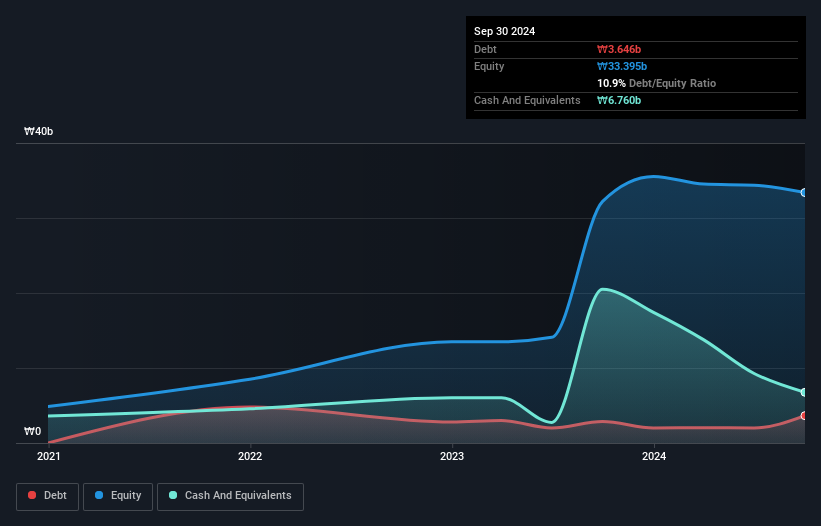Warren Buffett famously said, 'Volatility is far from synonymous with risk.' So it seems the smart money knows that debt - which is usually involved in bankruptcies - is a very important factor, when you assess how risky a company is. We note that Hanssak Co., Ltd. (KOSDAQ:430690) does have debt on its balance sheet. But the more important question is: how much risk is that debt creating?
When Is Debt A Problem?
Debt assists a business until the business has trouble paying it off, either with new capital or with free cash flow. In the worst case scenario, a company can go bankrupt if it cannot pay its creditors. While that is not too common, we often do see indebted companies permanently diluting shareholders because lenders force them to raise capital at a distressed price. Of course, debt can be an important tool in businesses, particularly capital heavy businesses. The first thing to do when considering how much debt a business uses is to look at its cash and debt together.
See our latest analysis for Hanssak
What Is Hanssak's Debt?
You can click the graphic below for the historical numbers, but it shows that as of September 2024 Hanssak had ₩3.65b of debt, an increase on ₩2.87b, over one year. But on the other hand it also has ₩6.76b in cash, leading to a ₩3.11b net cash position.

A Look At Hanssak's Liabilities
The latest balance sheet data shows that Hanssak had liabilities of ₩6.71b due within a year, and liabilities of ₩307.6m falling due after that. On the other hand, it had cash of ₩6.76b and ₩1.83b worth of receivables due within a year. So it can boast ₩1.57b more liquid assets than total liabilities.
This surplus suggests that Hanssak has a conservative balance sheet, and could probably eliminate its debt without much difficulty. Simply put, the fact that Hanssak has more cash than debt is arguably a good indication that it can manage its debt safely. There's no doubt that we learn most about debt from the balance sheet. But it is Hanssak's earnings that will influence how the balance sheet holds up in the future. So when considering debt, it's definitely worth looking at the earnings trend. Click here for an interactive snapshot.
In the last year Hanssak wasn't profitable at an EBIT level, but managed to grow its revenue by 16%, to ₩26b. That rate of growth is a bit slow for our taste, but it takes all types to make a world.
So How Risky Is Hanssak?
While Hanssak lost money on an earnings before interest and tax (EBIT) level, it actually booked a paper profit of ₩1.2b. So when you consider it has net cash, along with the statutory profit, the stock probably isn't as risky as it might seem, at least in the short term. With mediocre revenue growth in the last year, we're don't find the investment opportunity particularly compelling. There's no doubt that we learn most about debt from the balance sheet. However, not all investment risk resides within the balance sheet - far from it. We've identified 5 warning signs with Hanssak (at least 3 which are a bit unpleasant) , and understanding them should be part of your investment process.
Of course, if you're the type of investor who prefers buying stocks without the burden of debt, then don't hesitate to discover our exclusive list of net cash growth stocks, today.
Valuation is complex, but we're here to simplify it.
Discover if Hanssak might be undervalued or overvalued with our detailed analysis, featuring fair value estimates, potential risks, dividends, insider trades, and its financial condition.
Access Free AnalysisHave feedback on this article? Concerned about the content? Get in touch with us directly. Alternatively, email editorial-team (at) simplywallst.com.
This article by Simply Wall St is general in nature. We provide commentary based on historical data and analyst forecasts only using an unbiased methodology and our articles are not intended to be financial advice. It does not constitute a recommendation to buy or sell any stock, and does not take account of your objectives, or your financial situation. We aim to bring you long-term focused analysis driven by fundamental data. Note that our analysis may not factor in the latest price-sensitive company announcements or qualitative material. Simply Wall St has no position in any stocks mentioned.
About KOSDAQ:A430690
Low risk with imperfect balance sheet.
Market Insights
Community Narratives


Recently Updated Narratives


Q3 Outlook modestly optimistic


Alphabet: The Under-appreciated Compounder Hiding in Plain Sight


MINISO's fair value is projected at 26.69 with an anticipated PE ratio shift of 20x
Popular Narratives


The company that turned a verb into a global necessity and basically runs the modern internet, digital ads, smartphones, maps, and AI.


MicroVision will explode future revenue by 380.37% with a vision towards success



